DICTIONARY OF WINE
General Editor
SIMON COLLIN

First published in Great Britain 2004
This electronic edition published 2011
Bloomsbury Publishers Plc, 36 Soho Square, London W1D 3QY
www.bloomsbury.com
www.acblack.com
Copyright Bloomsbury Publishing 2004
Copyright Bloomsbury Publishing Plc, 2011
All rights reserved; no part of this publication may be reproduced, stored in a retrieval system or transmitted by any means electronic, digital, mechanical, photocopying or otherwise, without the prior written permission of the Publisher.
No responsibility for loss caused to any individual or organisation acting or refraining from action as a result of the material in this publication can be accepted the Publisher or the authors.
A CIP catalogue record for this book is available from the British Library
Print ISBN: 978 0 7475 6641 0
Electronic ISBN: 978 1 4081 3632 4
CONTENTS
General Editor
SIMON COLLIN
Special thanks to:
Laurie Webster, Dan Wilkinson, Corinna Thompson, Lynne Coyle and all the managers of branches, past and present, whose knowledge and passion for wine have been the inspiration for this book.
Editors
Lesley Brown, Gordon Kerr
Pronunciations
Dinah Jackson
Adviser
John Beeston
Author of Concise History of Australian Wine
and Wine Regions of Australia
Maps
bounford.com
Text production and Proofreading
Katy McAdam, Daisy Jackson, Joel Adams,
Sarah Lusznat, Charlotte Regan,
Emma Harris, Ruth Hillmore
BLOOMSBURY REFERENCE
Dictionaries Publisher Executive Editor Production Editor
Faye Carney Susan Jellis Nicky Thompson
Matthew Jukes
Over the years I have often found myself both amazed and impressed by the level of wine knowledge and honesty of UK wine drinkers in discussing the taste of wine. Interestingly, the same cannot be said for our friends around the world. In fact, wine-producing countries, in my experience, often have the least well-informed citizens. I have puzzled over why this might be. Perhaps they are too close to the subject and, as they inevitably drink wine regularly, often every lunch and dinner, they dont tend to think much about whats in the glass. Also, they rarely drink wine from outside their own locale. We are lucky in this respect. Wine drinking is our number one social hobby!
With a few notable exceptions, we dont make much wine over here, and coupled to the fact that we have long been seafarers and merchants and are therefore connoisseurs of wares from overseas, we have learned to appreciate wine at a much faster rate than other nations. Wasnt it the Brits whose palates changed the style of Champagne from sweet to the dry style it is today? Also, over the centuries, the British were responsible, to a greater or lesser degree, for the production of other great wine styles like Bordeaux, port and Madeira. These days, with easier, faster transport and more wanderlust, even historically introspective regions like Burgundy are teeming with winemakers who have worked all over the world, experiencing and enjoying the cooking, culture and wines from the New World as well as their own beloved Old World creations. This may be true about the winemakers, but it is far from accurate when it comes down to the everyday Burgundians diet. I imagine they dont often drink anything other than their own local stuff. Would any of them have ever seen a bottle of Aussie Shiraz or Chilean Carmenre? Sadly, I very much doubt it. We, in the UK, are the consumers who inhabit the global driving seat, and we continue to set the pace. Even the Americans are playing catch-up with us as regards Australia, New Zealand and South Africa.
So do we make the most of this fortunate position? On the whole, yes. A London cabbie the other day swore blind that he hadnt touched a drop of wine until four or five years ago (he was exclusively a beer man), and now he is partial to Chilean Merlots, Chianti and Cte du Rho es, and he even went as far as saying he couldnt get his head around South African Pinotage. For me this was a remarkably astute rundown of his exact wine needs. This core knowledge is creeping into society every day. I particularly liked his point about Pinotage, which was, admittedly, accurate in my opinion! We tend to take our knowledge levels, no matter how small, for granted, because wine is becoming ingrained in our foodie culture. But we must all congratulate ourselves for coming so far so fast. Even you, for picking up (and hopefully buying) this book, would be considered an aficionado, whether you feel it is warranted or not.
es, and he even went as far as saying he couldnt get his head around South African Pinotage. For me this was a remarkably astute rundown of his exact wine needs. This core knowledge is creeping into society every day. I particularly liked his point about Pinotage, which was, admittedly, accurate in my opinion! We tend to take our knowledge levels, no matter how small, for granted, because wine is becoming ingrained in our foodie culture. But we must all congratulate ourselves for coming so far so fast. Even you, for picking up (and hopefully buying) this book, would be considered an aficionado, whether you feel it is warranted or not.
As a wine writer, I am delighted about this desire for wine knowledge because we have never had it so good there has never in history been as wide a range of global wine sold in the UK as there is today. More choice, more enthusiasm, more chance to try anything and everything. But hang on. If we are so good at it then why do we need a brand new dictionary?
We are fortunate enough to have a very active wine market and some cracking buyers in the UK. But it has to be said everyones knowledge could always be tweaked even more.
I travel around the country hosting tastings and have met thousands of people of all ages and backgrounds. Gosh, some of the studious sorts blind me with their knowledge of Bordeaux blends, down to the exact percentage, others talk about malolactic fermentation and Brettanomyces until they are blue in the face. I find this exciting and encouraging, as this means that there are people out there who are as bonkers about this massive and continuously evolving subject as I am. These people I call the haves, and they are all very welcome. But I also adore talking to the have nots. Now before you think me rude, I am referring to those who have been well and truly bitten by the wine bug and those who have not. The have nots are an equally fascinating Venn diagram of people. This contented band of keen gluggers is happy to bumble along buying whatever seems to work, drinking hits one night and misses the next. To find out whether you are a have or a have not, did you understand the malo and Brett sentence a few lines back? If no, this doesnt make any difference to me, as you are the proud possessor of something the haves havent got. You know exactly what you like and why you like it. The haves pretend to like and understand everything, which by the way is impossible. They deliberate over choosing a bottle in the shop for hours, wasting valuable drinking time (I am one, I should know). You have nots are a wonderful lot. You may be bemused amateurs and enthusiastic drinkers, but on the occasion that you do absorb a fact youll never let it go. To you, finding out that Marlborough in New Zealand and Sancerre in France share a common grape variety (Sauvignon Blanc links them) is nothing short of a revelation. This fact may not have bothered you before, as you have always enjoyed both styles of wine, but when the penny drops, it is an unexpected and welcome bonus and this book can give you a boost like that every day.
Now I have read this book and, despite classing myself in the have category, have learned a ton from these pages. This is not surprising, as wine is a monstrous subject never knowingly tamed by any one individual, and I suppose that is part of its charm. Remember you can never truly be an expert only the wine can be that.


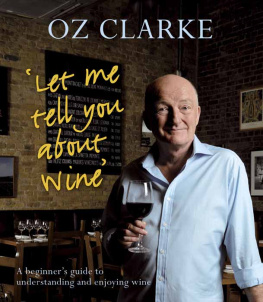
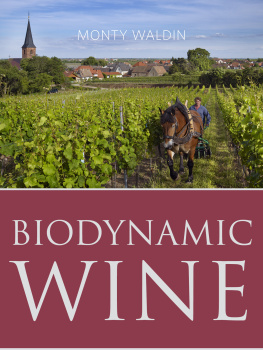
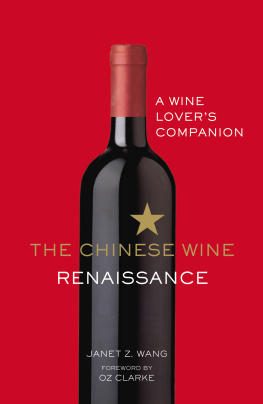
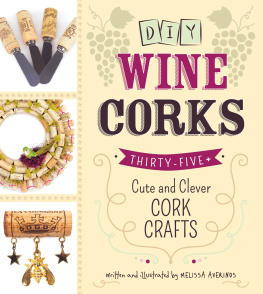
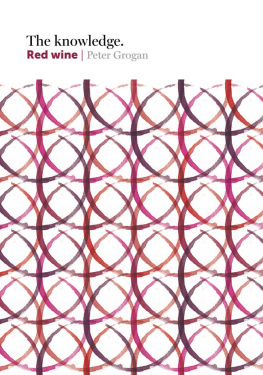
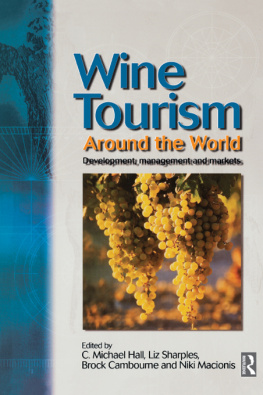
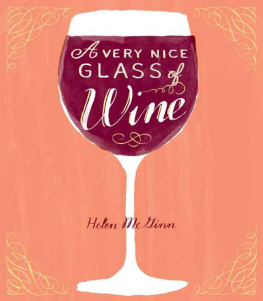
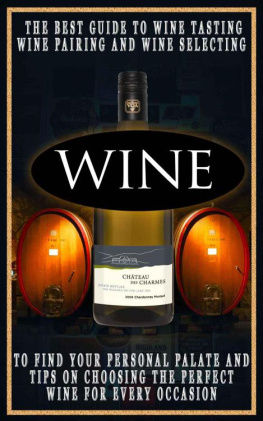

 es, and he even went as far as saying he couldnt get his head around South African Pinotage. For me this was a remarkably astute rundown of his exact wine needs. This core knowledge is creeping into society every day. I particularly liked his point about Pinotage, which was, admittedly, accurate in my opinion! We tend to take our knowledge levels, no matter how small, for granted, because wine is becoming ingrained in our foodie culture. But we must all congratulate ourselves for coming so far so fast. Even you, for picking up (and hopefully buying) this book, would be considered an aficionado, whether you feel it is warranted or not.
es, and he even went as far as saying he couldnt get his head around South African Pinotage. For me this was a remarkably astute rundown of his exact wine needs. This core knowledge is creeping into society every day. I particularly liked his point about Pinotage, which was, admittedly, accurate in my opinion! We tend to take our knowledge levels, no matter how small, for granted, because wine is becoming ingrained in our foodie culture. But we must all congratulate ourselves for coming so far so fast. Even you, for picking up (and hopefully buying) this book, would be considered an aficionado, whether you feel it is warranted or not.